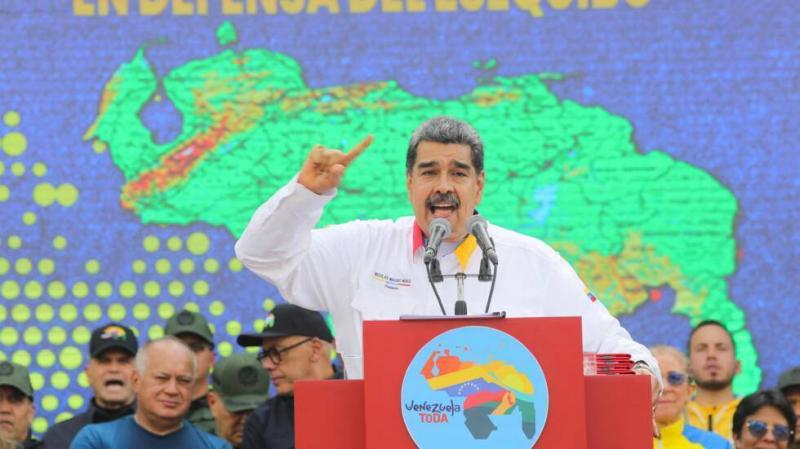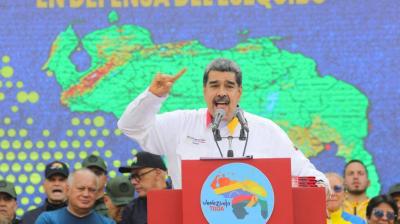Venezuela is organizing presidential elections this Sunday marked by intense tension between two rivals, both claiming victory: the outgoing president Nicolás Maduro, who warned of a "bloodbath," and the candidate for "change," Edmundo González Urrutia. About 21 million voters out of 30 million Venezuelans are called to polling stations from 6:00 AM (10:00 AM UTC) to 6:00 PM (10:00 PM UTC) to cast their votes, with results expected to be announced overnight.
Ten candidates are competing in the race, but in reality, the competition lies primarily between Maduro (61 years old), who is seeking a third six-year term, and the former diplomat González Urrutia (74 years old), who unexpectedly replaced the popular opposition leader María Corina Machado after authorities disqualified her from running.
Polls indicate a significant lead for the opposition, but some observers assert that the competition is fierce. The government, on the other hand, relies on different figures to assure its confidence in victory. Maduro, the successor of former president Hugo Chávez, who ruled from 1999 until his death in 2013, vowed not to relinquish power, threatening chaos without him while leaning on the military and a police campaign against the opposition.
Maduro stated, "The future of Venezuela for the next fifty years is being decided on July 28, between Venezuela's peace or violence. Peace or war," warning of the possibility of a "bloodbath in a civil war among brothers incited by fascists." Brazilian President Luiz Inácio Lula da Silva described these remarks as "horrifying," commenting that "Maduro needs to learn: when we win, we stay. When we lose, we leave."
For his part, González Urrutia announced on Saturday that Sunday would undoubtedly witness "the most important democratic expression of the people in recent years," urging "citizens to go to polling stations at the end of the day and ensure the clarity of the results achieved."
University professor Luis Salamanca noted, "There is a movement for change," adding that under "normal voting conditions... there will be a very significant victory for the opposition." Most polls expect Maduro to receive no more than 30% of the votes, while the opposition is projected to win between 50% and 70%.
Mercedes Enriquez, a 68-year-old retiree, remarked, "We can no longer tolerate this dictatorship," while Anna Colmenares, a psychology student, said, "There is no hope for life here, no economic hope, no hope of finding a job."
The Oil Crisis
The oil-rich nation, once one of the wealthiest countries in Latin America, faces an unprecedented economic crisis. Oil production has plummeted from more than three million barrels per day to less than one million due to mismanagement and corruption, with GDP shriveling by 80% over ten years and the country experiencing hyperinflation that forced authorities to partially dollarize the economy. Seven million Venezuelans have left the country, while the majority of citizens suffer from poverty amidst the complete collapse of healthcare and education systems. Authorities maintain that the crisis is a result of a "criminal blockade" imposed on the country.
The United States has intensified its sanctions against Venezuela to oust Maduro following his controversial re-election in 2018, which the opposition denounced as fraudulent, sparking protests that were met with heavy repression. Washington has sought to force Maduro to hold "democratic and competitive elections" without successfully pressuring Caracas, which confirmed Machado's ineligibility to run and withdrew its invitation to the European Union to send observers to verify the voting process.
Simultaneously, the White House left the door open for oil companies to operate in Venezuela by issuing licenses for oil and gas extraction, aiming to revive oil production in the country amid rising market pressures due to the crises in Ukraine and the Middle East.
The Military
Freddy Luviera (27), a Maduro supporter, stated, "We are confident that the economic recovery is here, and it will expand." Many fear that the president, whom the opposition describes as a "dictator," will attempt to rig the elections. Juanita Gubertus from Human Rights Watch remarked, "While it is unlikely that the elections will be free and fair, Venezuelans have the best chance in over a decade to choose their government themselves."
Rebecca Hanson from the University of Florida noted the possibility of "violence after the announcement of results," indicating that the likelihood of Maduro agreeing to step down is "low." The position of security forces will be crucial. Maduro confirmed that "the National Bolivarian Armed Forces support me," while his opponent González Urrutia called on the military to "respect and enforce the will of the sovereign people" of Venezuela.




